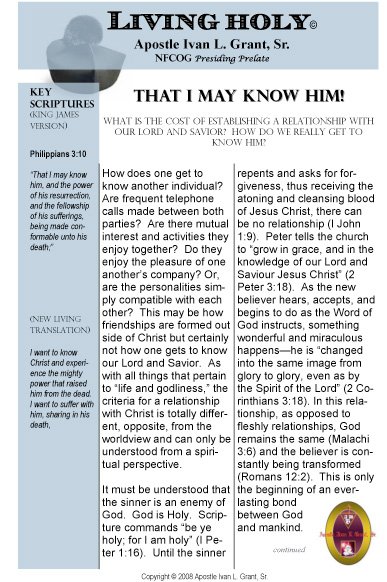That I may know him, and the power of his resurrection, and the fellowship of his sufferings, being made conformable unto his death;
Philippians 3:10
How does one get to know another individual? Are frequent telephone calls made between both parties? Are there mutual interest and activities they enjoy together Do they enjoy the pleasure of one another’s company? Or, are the personalities simply compatible with each other? This may be how friendships are formed out side of Christ but certainly not how one gets to know our Lord and Savior. As with all things that pertain to “life and godliness,” the criteria for a relationship with Christ is totally different, opposite, from the worldview and can only be understood from a spiritual perspective.
It must be understood that the sinner is an enemy of God. God is Holy. Scripture commands “be ye holy; for I am holy” (1 Peter 1:16). Until the sinner repents and asks for forgiveness, thus receiving the atoning and cleansing blood of Jesus Christ, there can be no relationship (1 John 1:9). Peter tells the church to “grow in grace, and in the knowledge of our Lord and Saviour Jesus Christ” (2 Peter 3:18). As the new believer hears, accepts, and begins to do as the Word of God instructs, something wonderful and miraculous happens — he is “changed into the same image from glory to glory, even as by the Spirit of the Lord” (2 Corinthians 3:18). In this relationship, as opposed to fleshly relationships, God remains the same (Malachi 3:6) and the believer is constantly being transformed (Romans 12:2). This is only the beginning of an everlasting bond between God and mankind.
Apostle Paul, after receiving Christ, being both obedient to His commands and having experienced the joy of salvation, now wanted a deeper commitment to Him and cried out, “that I may know him and the power of his resurrection, and the fellowship of his sufferings” (Philippians 3:10). To understand his Lord and Savior, Paul wanted to feel as He felt, endure suffering as Christ, experience rejection and loneliness; then and only then could he claim that he “knew” Jesus. Paul makes it very clear to the church of today that the only way we really know Christ is to suffer as He did.
Whether it’s accepted or not by today’s church, the Bible cautions “yea, and all that will live godly in Christ Jesus shall suffer persecution” (2 Timothy 3:12). Certainly, being persecuted and suffering for Christ’s sake is not the popular message being proclaimed today. In reality, suffering” allows the believer to view Christ in a completely different manner (as a Savior who suffered and has power to help), and gain valuable spiritual insight that otherwise would not have been gleaned. Job, after his nineteen (19) year long ordeal encouraged the saints of today, “I uttered that I understood not; things too wonderful for me, which I knew not” (Job 42:3). Even after thinking he knew God prior to his trial, Job admitted there were things he would not have learned without suffering and subsequently, after enduring his trial, he understood things differently.
Relationships are only as strong as the adversity endured. When the revealed spiritual truth of “suffering to gain knowledge” is readily accepted, the people of God can cry as Apostle Paul did “that I may know Him”.

Our monthly email newsletter keeps you up to date with the Nation of NFCOG.